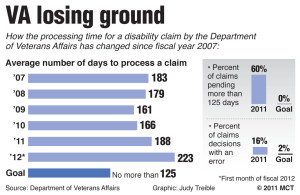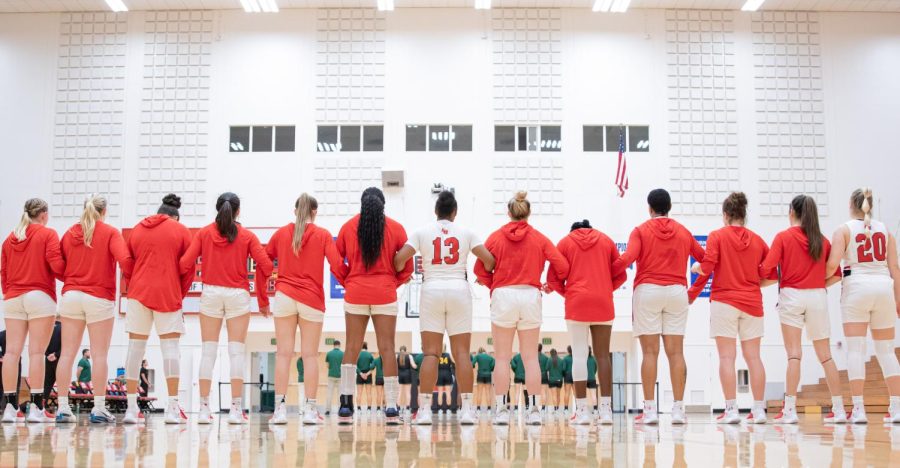In the wake of the wars in Afghanistan and Iraq, an influx of new veterans is discovering the mixed history of veteran treatment in this country.
They have discovered the long-standing benefits of the GI Bill and its legislative successors that provide veterans the opportunity to receive a college education.
These veterans have also encountered fellow citizens looking to take advantage of the system provided to give them that opportunity.
President Obama signed an executive order last Friday intended to deal with aggressive recruiting of veterans by college recruiters who were providing minimal information or even lying about what services and benefits existed to veterans at their sometimes non-accredited universities.
In one case, revealed by a Frontline report, a college recruiter had targeted Marines with brain injuries at Camp Lejeune in North Carolina. Some of these Marines barely remembered the recruiter or what classes they signed up for but found they had already been charged for application fees and university fees.
While this example alludes to private citizens and organizations mistreating veterans, the federal and state governments’ records on veteran affairs can point to specific legislative and administrative endeavors to aid veterans when they return home.
The manner in which this aid is being distributed, however, exposes failure on the part of the government to adequately provide these services, especially to those veterans dealing with the mental and physical scars of war. This failure is being seen all too close to home.
The director of the Department of Veterans Affairs’ (VA) Oakland Regional Office will be appearing before a California Congressional delegation, according to a report by The Bay Citizen, to answer questions about the way in which disability claims filed by veterans is being handled.
The criticism being levied at the office focuses around the lengthy time it takes for claims to be processed and the rate of failure in making the proper decision towards granting disability claims.
The average waiting time for veterans in Northern California to have their disability claim fully processed, according to figures released by the VA itself, is 320 days and of those still waiting for a decision nearly 80 percent have been waiting over 125 days.
Last week Dave Smith, a Marine who served two tours in Iraq and is currently a student at UC Berkeley, was granted his disability claim for depressions, back pain and injuries to both his knees just last week. It took 414 days for that claim to be decided.
This egregiously lengthy processing time is not the only problem facing veterans who attempt to make a disability claim at the Oakland office.
In a hearing before Congress the VA revealed that the error rate on disability decisions in the Oakland office was 26 percent meaning that out of every four veterans who have applied for disability, one of them has had their claim wrongly decided. Then again botched handling of disability claims is nothing new to the VA.
Take the case of Leroy MacKlem, a World War II veteran who this year the New York Times reported finally won his disability claim from 1950 and is set to receive nearly 60 years in disability compensation totalling roughly $400,000.
There is an incredible strain that VA offices are dealing with as the sheer number of disability claims has risen. The Washington Post reported last month that the backlog of claims before the VA totals roughly 903,000 which they noted as a growth of nearly 500,000 claims in the last three years alone.
There is a difference however between an explanation and an excuse. There is no excuse for this failure on the part of the VA and specifically their Oakland Regional Office.
Part of the Congressional suggestions put forward was to add the Oakland office to a list of 12 other offices scheduled to switched to electronic systems in order to avoid the lengthy processing time of a paper based system but it is not enough.
Retraining and updating systems does not address the fact that fundamental failures occurred. Those responsible, whether individual workers or those setting policies in higher administration offices should be held accountable to those failures and where necessary dismissed.
There is a fundamental responsibility taken on by a government and its people when it sends its own off to war to deal with those injuries sustained by them.
The Oakland Regional Office of the VA cannot leave veterans dealing with the mental and physical scars of war waiting so long and fail to award claims correctly. We hold the responsibility for those scars, inflicted upon our fellow citizens because of their service to conflicts our government placed them in.
California has already sacrificed more lives to the wars in Iraq and Afghanistan than any other state according to the Center for Investigative Reporting.
What more will we ask the sons and daughters of California who came home alive to sacrifice?











